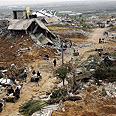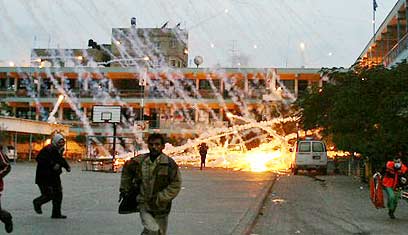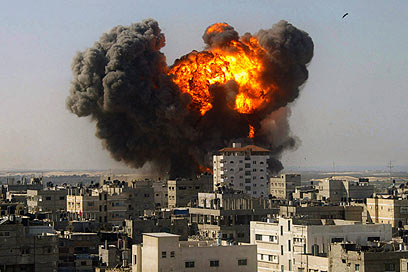
IDF: We don't have to promise not to hurt civilians
Response to UN aimed at countering Goldstone Report includes list of rules of engagement that were altered. Many officers outraged, say report is exaggerated, unnecessary apology that will tie military's hands in future
"You can't operate in the Gaza Strip as you would in a sterile area." This is the pivotal point of the criticism voiced on Wednesday in a conversation with Ynet by an IDF officer who served in Operation Cast Lead of the additional report issued by Israel to the UN to counter the Goldstone Report.
Like many other officers, he is outraged by the IDF report, which symbolizes in is eyes a defeatist attitude and an exaggerated apology.
"It is entirely uncertain that we need to promise the entire world that the next time there will be 'zero casualties' among civilians, because this won't happen," he said. "We were very moral during the previous operation, and thus we will be in the future. However, there is a limit as to how much we can present ourselves as the bad guys in the story."
Furthermore, the new orders and rules of engagement that have been promised are liable, many officers claimed, to harm the military's ability to function in battle. "We are going a few steps forward for the Palestinians and a few steps backwards for the IDF," said another officer. "It looks as though they were frightened by Goldstone, by 'what they'll say' about us."
150 investigations, 4 indictments
The said document, 37 pages long, was written by senior officials in the Military Prosecution, headed by Military Advocate General Avihai Mandelblit, and was laid on the tables of the UN last Friday. However, the Foreign Ministry decided not to issue it publicly except for a publication on its English-language website.
The report provides a response to the claims raised in the Goldstone Report and to international accusations against Israel for allegedly violating international laws of war. As such, the report is a continuation of the first report issued to the UN at the beginning of the year that had addressed the investigations completed at that point in time.
The report outlines five main issues: harming Palestinian civilians, damaging Palestinian property, damaging public institutions (including UN facilities), establishing a commission of inquiry into the Gaza flotilla (the Turkel Commission), and a chapter of findings.
Overall the new update reports on some 150 investigations launched following allegations made against Israel. Among others, four instances in which IDF soldiers were put on trial were mentioned. However, in the vast majority of the incidents outlined, Mandelblit did not find evidence of the allegations. Therefore, no disciplinary or judicial moves were made despite international accusations.
'Why limit use of weapon when there's no problem?'
Beyond the figures and statistics regarding the investigations, the report also explains the changes made in legislation and IDF rules of engagement regarding combat in urban areas and other additional future changes.
The report includes recommendations made by Mandelblit that were authorized by Chief of Staff Gabi Ashkenazi, who instructed that orders be reformulated in the spirit of the said recommendations.

White phosphorous rains down on UN compound during offensive (Photo: AFP)
Among the changes announced in the report, the IDF will add an officer for humanitarian affairs to each combat unit on the level of brigade and higher. Means for addressing the needs of a civilian population during combat have been added. However, most of the updates relate to rules of engagement.
The field commanders said they feel uncomfortable with what they perceive to be attempts to limit their movement in an already complex combat environment.
For instance, the IDF redefined more stringently the way in which mortars may be used while near populated areas or near sensitive facilities. It was also stipulated that the IDF will improve the mapping out of "sensitive areas." Beyond the IDF's existing mapping of hospitals, schools, mosques, and UN facilities, the military will need to identify ahead of time other busy areas, such as open-air markets.
It was also decided that the IDF will improve its operational procedures for notifying and providing instructions to civilian populations prior to evacuation.

Bombing of Rafah in January 2009 (Photo: AP)
Another outstanding limitation, regarding the use of phosphorous in built-up areas, has especially angered a military official familiar with the matter, especially after the IDF already elucidated in its previous report in response to the Goldstone Report that the use of phosphorous is entirely legal.
"On the one hand, the IDF is saying that the use of white phosphorous does not violate any law of war," the officials said. "But, on the other hand, it is making limitations. It looks like tying your own hands behind your back. Why should a weapon with which there is no problem be limited?"
The report also deals with the damage caused to private property during the offensive. Among other incidents, the report addresses an attack on a chicken coop, saying it was necessary in order to thwart terror activity initiated by Hamas. However, the report determined that the decision to attack the property should have been made by higher-ranking officers.
'Creating false expectations'
A standing order issued in 2009 determined the level of damage IDF forces can inflict on civilian infrastructure, as well as who is authorized to decide on such attacks. An IDF official said in response, "Not only does this demand the memorization of many details, it also creates a situation whereby the commander is more concerned with protecting the coop or greenhouse than his soldiers' lives."
The report also reveals some previously unpublished incidents, such as the death of 10 Palestinian civilians from IDF fire in Beit Lahiya on January 3, 2009. The attack targeted terrorists, but three Artillery Corps officers were disciplined for "failing to anticipate the risk to civilians posed by the missile they elected to use."
"Is it not enough that we have dozens of different aspects to take into account in the battlefield, now we have to calculate the damage each weapon will cause?" an Artillery Corps officer said. "The problem with disciplining these officers is that we are sending the world a message that we will always use the right ammunition. This is not realistic and creates false expectations."
Roni Sofer contributed to this report
- Follow Ynetnews on Facebook










